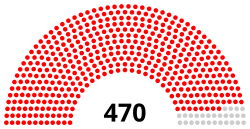Our website is made possible by displaying online advertisements to our visitors.
Please consider supporting us by disabling your ad blocker.
National Assembly of People's Power
National Assembly of People's Power Asamblea Nacional del Poder Popular | |
|---|---|
| 10th Legislature | |
 | |
| Type | |
| Type | |
| History | |
| Founded | 2 December 1976 |
| Preceded by | Congress of Cuba |
| Leadership | |
Esteban Lazo Hernández since 24 February 2013 | |
Vice president | Ana María Marí Machado since 2013 |
| Structure | |
| Seats | 470 |
 | |
Political groups |
|
| Elections | |
| Two-round system | |
Last election | 26 March 2023 |
Next election | 2028 |
| Meeting place | |
 | |
| El Capitolio, Havana | |
| Website | |
| www | |
 |
|---|
|
|
The National Assembly of People's Power (Spanish: Asamblea Nacional del Poder Popular) is the supreme organ of power of the Republic of Cuba. It is the only branch of government in the state, and per the principle of unified power, all state organs are subservient to it. It is currently composed of 470 representatives who are elected from multi-member electoral districts for a term of five years called consejos populares. The current President of the Assembly is Esteban Lazo Hernández. The Assembly only meets twice a year, with the 31-member Council of State exercising legislative power throughout the rest of the year.[2] The most recent elections were held on 26 March 2023. The number of deputies was reduced from 605 to 470 for the 2023 election.[3]
Liberal democracy is not practiced in Assembly elections in post-1959 revolutionary Cuba because the ruling Communist Party of Cuba (PCC) government does not permit competitive elections.[4][5] Cuba is a one-party state, with the PCC being described as the "superior driving force of the society and the state" in the Constitution of Cuba, and all other political parties are illegal.[5] There is only one candidate for each seat in the Assembly, and all candidates are nominated by committees that are firmly controlled by the PCC.[6][7] Voters can either select individual candidates on their ballot, select every candidate, or leave every question blank, but voters have no option to vote against candidates.[8][9] During the 2013 elections, around 80% of voters selected every candidate for the Assembly on their ballot, while 4.6% of voters submitted a blank ballot; no candidate for the Assembly has ever lost an election in Cuban history.[10]
- ^ Roman, Peter (2003). People's Power: Cuba's Experience with Representative Government. Rowman & Littlefield. pp. 131–132. ISBN 978-0-7425-2565-8. Retrieved 7 February 2023.
- ^ Constitution of the Republic of Cuba, 1976, Article 89: "The Council of State is the body of the National Assembly of People's Power that represents it in the period between sessions, puts its resolutions into effect and complies with all the other duties assigned by the Constitution. It is collegiate and for national and international purposes it is the highest representative of the Cuban state."
- ^ "Cuba: Freedom in the World 2021 Country Report". Freedom House. Retrieved 5 December 2021.
- ^ Multiple sources:
- Hyde, Susan D. (2011). The Pseudo-Democrat's Dilemma: Why Election Observation Became an International Norm. Cornell University Press. p. 123. ISBN 978-0-8014-6125-5.
- Galvis, Ángela Fonseca; Superti, Chiara (3 October 2019). "Who wins the most when everybody wins? Predicting candidate performance in an authoritarian election". Democratization. 26 (7): 1278–1298. doi:10.1080/13510347.2019.1629420. ISSN 1351-0347. S2CID 197727359.
- Domínguez, Jorge I.; Galvis, Ángela Fonseca; Superti, Chiara (2017). "Authoritarian Regimes and Their Permitted Oppositions: Election Day Outcomes in Cuba". Latin American Politics and Society. 59 (2): 27–52. doi:10.1111/laps.12017. ISSN 1531-426X. S2CID 157677498.
- Domínguez, Jorge I. (2021). "The Democratic Claims of Communist Regime Leaders: Cuba's Council of State in a Comparative Context". Communist and Post-Communist Studies. 54 (1–2): 45–65. doi:10.1525/j.postcomstud.2021.54.1-2.45. ISSN 0967-067X. S2CID 236365630.
- ^ a b "Cuba: Freedom in the World 2021 Country Report". Freedom House. Retrieved 5 December 2021.
- ^ Smyth, Regina; Bianco, William; Chan, Kwan Nok (25 April 2019). "Legislative Rules in Electoral Authoritarian Regimes: The Case of Hong Kong's Legislative Council". The Journal of Politics. 81 (3): 892–905. doi:10.1086/703068. ISSN 0022-3816. S2CID 159138096.
- ^ Braithwaite, Alex; Braithwaite, Jessica Maves (2020). "Restricting Opposition in Elections and Terrorist Violence". Terrorism and Political Violence. 32 (7): 1550–1572. doi:10.1080/09546553.2018.1495627. ISSN 0954-6553. S2CID 149575921.
- ^ Domínguez, Jorge I.; Galvis, Ángela Fonseca; Superti, Chiara (2017). "Authoritarian Regimes and Their Permitted Oppositions: Election Day Outcomes in Cuba". Latin American Politics and Society. 59 (2): 27–52. doi:10.1111/laps.12017. ISSN 1531-426X. S2CID 157677498.
- ^ Leogrande, William M. (2012). The Cuban communist party and electoral politics: Adaptation, succession, and transition. Cuba Transition Project, Institute for Cuban and Cuban-American Studies, University of Miami. ISBN 978-0-9704916-2-6.
- ^ Fonseca Galvis, Ángela; Superti, Chiara (3 October 2019). "Who wins the most when everybody wins? Predicting candidate performance in an authoritarian election". Democratization. 26 (7): 1278–1298. doi:10.1080/13510347.2019.1629420. ISSN 1351-0347. S2CID 197727359.
Cite error: There are <ref group=lower-alpha> tags or {{efn}} templates on this page, but the references will not show without a {{reflist|group=lower-alpha}} template or {{notelist}} template (see the help page).
Previous Page Next Page
الجمعية الوطنية (كوبا) Arabic Asamblea Nacional del Poder Popular de Cuba AST Assemblea Nacional del Poder Popular de Cuba Catalan Asamblea Nacional del Poder Popular Danish Asamblea Nacional del Poder Popular German Εθνική Συνέλευση της Λαϊκής Εξουσίας Greek Nacia Asembleo de la Popola Povo de Kubo EO Asamblea Nacional del Poder Popular de Cuba Spanish مجمع ملی قدرت خلق FA Assemblée nationale du pouvoir populaire French


